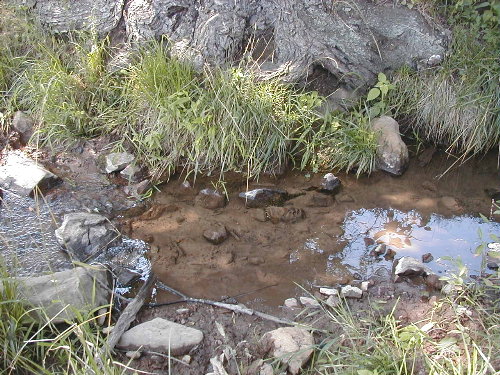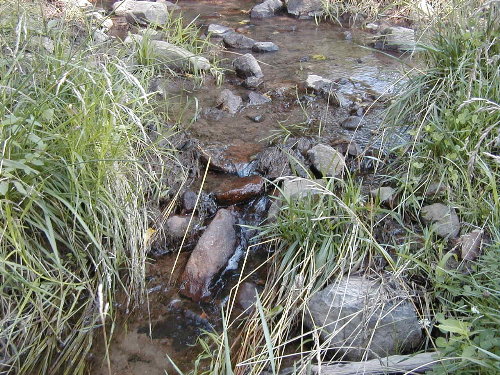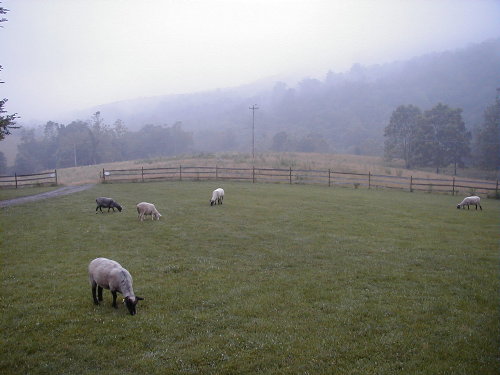
Notes from a Hillside Farm; being Musings and Observations on Life, Letters, and our Most Holy Faith, by a Lawyer, Sheep- farmer, and Communicant of the Orthodox Church
Monday, July 28, 2003
After a cold spring and colder winter, it comes as a shock to find ourselves (at last) in deep southern summer. Hot, and so humid the least effort leaves you dripping. As I was pounding in metal fence post stakes this weekend, rebuilding the fence between the barn and the little spring that feeds our brook, my thoughts turned to rest, shade and running water:


From time to time I use my friend Jonathan Chaves' wonderful translations of Chinese poetry on this site. Jonathan claims to be the world's only Jewish, Eastern Orthodox scholar of Classical Chinese literature. Like the Confucian poets he translates, he is also something of a philosopher. He has written a substantial exploration of epistemology titled Kicking the Stone and Viewing the Icon: Realist Epistemology Between Heaven and Earth, which is now online. Beginning with a quote from Chesterton, it spins through Aquinas, Dr. Johnson, early nineteenth century English novels, John of Damascus, Gregory Nanzianus, Gregory Palamas, and Vogelin, stopping along the way to examine the pernicious influence of both nominalism and deconstruction. It is worth your time if you are interested in such things.
Sunday, July 27, 2003
I have been reading lately in Powers of Heaven and Earth; New and Selected Poems, by John Frederick Nims. Here is a new favorite from the epigrams interspersed between his longer works:
Avant-garde
"A dead tradition! Hollow shell!
Outworn, outmoded--time it fell.
Let's make it new. Rebel! Rebel!"
Said cancer-cell to cancer-cell.
Reading Nims, whose published work spans from the forties until 1999, when he died, I realized that he has a characteristic that I miss in most of our contemporary writers; wit. In our post-modern age we have sarcasm, satire, and irony, but, rarely, wit. Wit shares in post-modernity's delight in word-play. Where wit parts with post-modernity is that wit assumes the existence of standards, of ideals, and skewers our failure to live up to them. In our post-modern days we, by contrast, seem to have come to the conclusion that, since no one lives up to an ideal, it is hypocrisy to hold one. Cleverly pointing out the gap between the real and the ideal is pointless, if ideals themselves are fictions promoted by the dominant class structure. Holding firmly to the existence of standards, wit plays in that gap between our actions and our best intentions. Here is another example from Nims:
Contemplation
"I'm Mark's alone!" you swore. Given cause to
doubt you,
I think less of you, dear. But more about you.
Here the poet makes a double-play, skewering both the narrator and the lady in question, as both fail to live up to the ideal of fidelity. The play of wit, of course, is not the same thing as actually repenting of our sins and hypocrisies. What use is it then? Perhaps it is as close as some of us can come to humility; recognizing our own sins as we smile at our neighbor's. As Nims says in another epigram, directed to
You Pious People
Most any sin--read Scripture if you doubt it--
'S forgiven sooner than righteousness about it.
Avant-garde
"A dead tradition! Hollow shell!
Outworn, outmoded--time it fell.
Let's make it new. Rebel! Rebel!"
Said cancer-cell to cancer-cell.
Reading Nims, whose published work spans from the forties until 1999, when he died, I realized that he has a characteristic that I miss in most of our contemporary writers; wit. In our post-modern age we have sarcasm, satire, and irony, but, rarely, wit. Wit shares in post-modernity's delight in word-play. Where wit parts with post-modernity is that wit assumes the existence of standards, of ideals, and skewers our failure to live up to them. In our post-modern days we, by contrast, seem to have come to the conclusion that, since no one lives up to an ideal, it is hypocrisy to hold one. Cleverly pointing out the gap between the real and the ideal is pointless, if ideals themselves are fictions promoted by the dominant class structure. Holding firmly to the existence of standards, wit plays in that gap between our actions and our best intentions. Here is another example from Nims:
Contemplation
"I'm Mark's alone!" you swore. Given cause to
doubt you,
I think less of you, dear. But more about you.
Here the poet makes a double-play, skewering both the narrator and the lady in question, as both fail to live up to the ideal of fidelity. The play of wit, of course, is not the same thing as actually repenting of our sins and hypocrisies. What use is it then? Perhaps it is as close as some of us can come to humility; recognizing our own sins as we smile at our neighbor's. As Nims says in another epigram, directed to
You Pious People
Most any sin--read Scripture if you doubt it--
'S forgiven sooner than righteousness about it.
Wednesday, July 23, 2003
If you have visited this site within the past twelve hours and found a rather different page than the one you were expecting, no I haven't headed in a radically new direction. Blogger appeared to go insane for a while and linked my url to someone else's page. I hope everything is fixed. While the page has not undergone a full metamorphosis, I am doing a little housecleaning on the site. The links on the left are undergoing a long overdue sorting and updating. If you would like a link on the site and I haven't put you in yet, let me know. The categories are somewhat arbitrary and subject to change, so if you don't like where I've put you, shout out and I'll try to find a more congenial pigeonhole.
Saturday, July 19, 2003


Easy-flowing brook,
Hushed--till root or rock impede.
Then it learns to sing.
Ragdale Haiku, John Frederick Nims
Tuesday, July 15, 2003
The shepherdess nuns at Holy Myrhbearers Monastery have updated the page for Maude, their spokessheep. If you like the photos on this site, go take a look at the wonderful pictures of the new additions to their flock. While you are there, stop by the online store and pick up something. Like most monastics, the sisters try and support themselves with the labor of their own hands. The sisters publish a small review twice yearly, "Essays and Notes," which is always worth reading. Mother Raphaela's essays exhibit a deep spirituality combined with that rarest of virtues in the religous life, common sense. Click on the link for samples, or, better yet, buy her first collection Living in Christ and support the sisters' work.
Saturday, July 12, 2003
I have little enough time these days to update one weblog, so of course, I have now started a second. It too, I expect will see sporadic updates. Here is the intro to the new site:
Sometime back I had planned on adding a regular feature on Orthodox spirituality in our contemporary culture to my Notes From a Hillside Farm weblog. As that site has developed, it no longer seems an appropriate forum for longer pieces. So now I would like to introduce "son" of Hillside Farm; The Suburban Ascetic. This site, as the subtitle suggests, will be a place to put occasional longer pieces on Orthodox spiritual life lived, not in monasteries or some dream of Byzantium or Holy Russia, but in contemporary America. By way of a beginning, I have reposted some thoughts on the Jesus Prayer, originally written on Hillside Farm a year ago.
Sometime back I had planned on adding a regular feature on Orthodox spirituality in our contemporary culture to my Notes From a Hillside Farm weblog. As that site has developed, it no longer seems an appropriate forum for longer pieces. So now I would like to introduce "son" of Hillside Farm; The Suburban Ascetic. This site, as the subtitle suggests, will be a place to put occasional longer pieces on Orthodox spiritual life lived, not in monasteries or some dream of Byzantium or Holy Russia, but in contemporary America. By way of a beginning, I have reposted some thoughts on the Jesus Prayer, originally written on Hillside Farm a year ago.
Visitor

Redsox, the sheep pictured above, was a bottle lamb, born half-dead and brought back to life by my wife with "mouth to snout resuscitation." She spent her first few weeks being bottle fed in a box in the basement intensive care ward. To our amazement, she survived and thrived. When she was older she used the children's small plastic playhouse as a barn, growing strong enough on a diet of front yard grass and Susan's back yard roses to rejoin the flock. She adapted to life as a regular sheep quite well, though she still comes up to see us, her first flock, when we are out by the pasture.

Redsox, the sheep pictured above, was a bottle lamb, born half-dead and brought back to life by my wife with "mouth to snout resuscitation." She spent her first few weeks being bottle fed in a box in the basement intensive care ward. To our amazement, she survived and thrived. When she was older she used the children's small plastic playhouse as a barn, growing strong enough on a diet of front yard grass and Susan's back yard roses to rejoin the flock. She adapted to life as a regular sheep quite well, though she still comes up to see us, her first flock, when we are out by the pasture.
Thursday, July 10, 2003
Morning mist and trespassing ewes

This year has been hard on the sheep flock. A harsh winter followed by the wettest spring in recent memory has stressed lambs and ewes alike. The pastures, while green enough, are getting choked with weed and thistle who have formed a kind of vegetable mob, rioting in the wet fields. The ladies pictured above picked their way across the cattle guard, filled in with gravel wash from the latest downpours, to get at the more well-mannered grass in the yard. With all the labor and losses we have gone through together this spring, I didn't have the heart to chase them out. I left them to their breakfast as I went to pour the morning coffee.

This year has been hard on the sheep flock. A harsh winter followed by the wettest spring in recent memory has stressed lambs and ewes alike. The pastures, while green enough, are getting choked with weed and thistle who have formed a kind of vegetable mob, rioting in the wet fields. The ladies pictured above picked their way across the cattle guard, filled in with gravel wash from the latest downpours, to get at the more well-mannered grass in the yard. With all the labor and losses we have gone through together this spring, I didn't have the heart to chase them out. I left them to their breakfast as I went to pour the morning coffee.
Subscribe to:
Posts (Atom)
